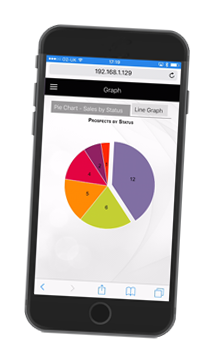Integration with Multiple Databases

Evoke allows you to seamlessly connect to and manage data with multiple databases, of all different types, from within a single app design.
Data management is a fundamental design feature of Evoke. It is designed to provide maximum flexibility as to how you use and combine data so that you are able to design your apps without being restricted by the way your data is held.
With Evoke you do not need to change your database, the structure of your database or any part of your database. Evoke provides for seamless integration with and full support of all types of SQL, Oracle and MultiValue databases. The full functionality of read/write/manipulation of data, using whatever structure was previously created, can be accommodated without the need to change the database. There is also support for stored procedures, DataBasic sub-routines, etc.
Seamless integration with multiple types of databases
Whatever your database (SQL Server, Oracle, D3, jBASE, or any of the databases listed below), Evoke provides secure and seamless connectivity, SQL - ADO.Net either via Windows or SQL Server authentication and MultiValue - either mv.Net or Rocket .Net connectivity tools
There is rich functionality in enabling you to define the data you require for your app, identify and connect your existing database(s) and to use your existing database structures. Within your app design you can use drag and drop/option select techniques to create data structures for the UI of your App, map physical database tables/files/objects on to Entity structures in your app design, further refining or expanding by automatically importing table structures.
Evoke's seamless database integration, of as many different databases as you may wish to access in a single app design, provides you with the scope and flexibility you need to design full function, sophisticated apps that fully meet your company's business requirements and support your data management objectives while remaining independent of any current database structures and restrictions.
SQL jBASE Oracle UniVerse SQLServer UniData QM SQL Server Express MYSQL MVON SQLLite mv.BASE D3 Informix Cache Reality

Evoke will fully manage and synchronise the flow of data between your user devices and your back office systems, and will ensure that data is always current and up-to-date at all points of access.
It will support multiple ways of providing user authentication. You can use your own existing user authentication file, an Evoke specific user table/object or Windows Active Directory authentication. Its your choice and you do not need to change your current database(s) or processes.
Evoke makes available various options as to how you can manage your data between the device and your database, in order to ensure that your app can function no matter what type of device, browser or the condition of communication networks. For larger selections of data or where communications are restricted, there are automatic options for data paging, and even options to temporarily limit large image transmissions.

Evoke allows you to connect to and manage data with multiple databases, of all different types, from within a single app design. For example, an Evoke app can use an SQLServer database to manage your Products table, a Universe database to hold and manage your Orders, an Oracle database for your Suppliers and a jBASE database for the Users/Personnel, etc. All will work seamlessly together and interact within the same Evoke designed app.
Of course, this also make migration from one database to another, in the future, incredibly easy and where your company may be SQL based but have legacy MultiValue systems and databases, then Evoke will accommodate both types of database, in the same app.
For MultiValue users, find out more about MultiValue Integration.
